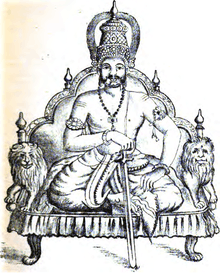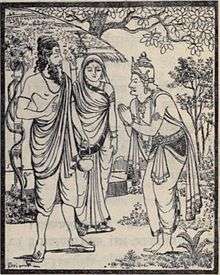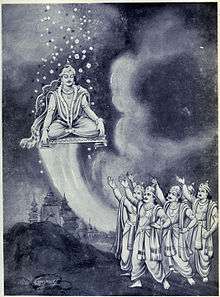Yayati
According to Hinduism, Yayāti (Sanskrit: ययाति) was a Puranic king. He was the son of King Nahusha and his wife Ashokasundari,[1] daughter of Shiva and Parvati, and he was one of the ancestors of Pandavas and Yaduvanshis. He had five brothers: Yati, Samyati, Ayati, Viyati and Kriti, although they were the children of Virajas, daughter of the Pitris. Yayāti had conquered the whole world and was the Chakravartin Samrat ("Universal Monarch" or "World Emperor"). He married Devayani and took Sharmishtha, daughter of king Vrishparva and maid of Devayani to his empire. Devayani was the daughter of Shukracharya, the priest of the Asuras. Later he copulates with Sharmistha. After hearing of his relationship with Sharmishtha, Devayani complains to her father Shukracharya, who in turn curses Yayāti to old age in the prime of life, but later allows him to exchange it with his son, Puru. His story finds mention in the Mahabharata-Adi Parva and also Bhagavata Purana.[2]
| Yayati | |
|---|---|
| Mahabharata character | |
 Yayāti | |
| In-universe information | |
| Family | Nahusha (father), Ashokasundari (mother) |
| Spouse | Devayani, Sharmishtha |
| Children | Yadu, Turvashu, Anu, Druhyu and Puru (Sons) Madhavi (Daughter) |
Genealogy and early life
Brahma's son was Atri, a Brahmarshi. Atri's son was Chandra, the Moon god. Chandra gave rise to the lunar dynasty or the Chandravanshi Dynasty. Chandra's son was Budha. Budha had a son with Manu's daughter Ila. Ila's son was Pururavas, who studied under Sage Kashyapa. Pururavas ruled over the city of Pratishthana. He married Apsara Urvashi and had many sons, of whom Ayus was the eldest. Ayus completed his education from Sage Chyavana and married the Asura princess Prabha. Ayus's son was Nahusha who was educated by the Sage Vashistha.
Upon Indra's loss of power, the gods asked Nahusha to be the new Indra. Nahusha ruled over the three worlds with the guidance of Sage Brihaspati for 100,000 years. Nahusha's sons headed by Yati and Yayāti were educated by thousands of Brahmarshis and the gods who used to wait upon their father. Nahusha eventually became arrogant and was punished severely as he was cursed by the saptrishi( seven sages) to be snake and to live further in the naraka( the hell). Indra was once more reinstated as the King of Gods.
The Mahabharata mentions about Yayati's achievements. He performed 100 Rajasuyas, 100 Ashwamedhas, 100 Vajapeyas, 1000 Atiratras, 1000 Pundarikas and innumerable Agnishthomas and Chaturmasyas. Wherever he hurled as Shami stick, he performed as sacrifice. He gave away mountains of gold and billions of cows to Brahmanas.
The story

The story of Yayāti appears in the eighteenth and nineteenth chapters of the ninth canto of the Bhagavata Purana.[3]
Yayāti's father, Nahusha is transformed into a python by a curse uttered by the sages as punishment for his arrogance. Yayāti's elder brother, Yati, is initially given the kingdom, but turns it down and instead becomes an ascetic. Yayāti then becomes king in his place and rules the earth. He appoints his four younger brothers to rule the world's cardinal directions.
One day Sharmishtha, daughter of the Danava king Vrishparva and Devayani, daughter of the Daitya sage Shukracharya, go with Sharmishtha's retinue to bathe in a forest pool not far from their home. After bathing, Devayani confuses Sharmishtha's sari with hers and puts it on instead. Sharmishtha returns, scolds Devayani for her mistake and belittles her with the jibe that she is the daughter of Shukracharya (Shukracharya being a sage and high priest and indeed the guru of all the Asuras - no mere employee) as Vrishparva's and their Kingdom lives on his blessings. This slur on herself and her father Vrishparva infuriates Sharmishtha. With the help of her servants, Sharmishtha throws the naked Devayani into a well and leaves the forest with her retinue. Later Yayāti, son of Nahusha, comes to the well for water and helps Devayani to climb out of it. Devayani requests Yayati to accept her as his wife. Yayati, considering this to be the will of providence, accepts her proposal.
Devayani resolves to make Sharmishtha her servant in revenge for trying to kill her by throwing her into the well. Sharmishtha's father, Vrishparva agrees to this, since he fears that the continued security of his kingdom would be in doubt without the sage counsel of Devayani's father Shukracharya. Sharmishtha also agrees to this to save the kingdom and becomes Devayani's maidservant. When Devayani moves to Yayati's palace after her marriage, Sharmishta, the maidservant, also goes along. Shukracharya, however, sternly warns Yayati never to have sex with Sharmishta.
After a long while, Sharmishtha comes to Yayāti and requests him to give her a child. He refuses and says that, if he were to do so, he could not face the wrath of Shukracharya. Nevertheless, Sharmishtha manages finally to convince him, saying that it would be against Dharma if he were to refuse her request; he being the king, it is his responsibility to ensure the needs of the citizens and she is desperate to have a child. He reluctantly agrees and they begin a relationship, in the hopes that she will conceive. In due course, Devayani gives birth to two sons Yadu and Turvasu while Sharmishtha begets three sons Druhyu, Anu and Puru.
Eventually Devayani learns of her husband's affair with Sharmishtha and complains to her father. Enraged at his son-in-law's disobedience, Shukracharya curses Yayāti with premature old age in punishment for inflicting such pain upon his daughter. However on learning Sharmishta's desire to become a mother, he later relents, telling Yayāti that if he can persuade one of his (Yayāti's) sons to swap ages with him he will be able to escape the curse and regain his lost youth for a while. Yayāti asks his sons if one of them will give up his youth to rejuvenate his father, but all refuse except the youngest, Puru (one of his sons by Sharmishtha). In grateful recognition of Puru's filial devotion, Yayāti makes him his legitimate heir and it is from the line of Puru - later King Puru - that the 'Kuru vamsha' (Kuru dynasty) later arises.[4]

In the words of the story, Yayāti enjoys all the pleasures of the senses 'for a thousand years' and, by experiencing passion to the full, comes to realise its utter futility, saying: "Know this for certain... not all the food, wealth and women of the world can appease the lust of a single man of uncontrolled senses. Craving for sense-pleasures is not removed but aggravated by indulgence even as ghee poured into fire increases it....One who aspires to peace and happiness should instantly renounce craving and seek instead that which neither grows old, nor ceases - no matter how old the body may become."[3] Having found wisdom by following the road of excess, Yayāti gratefully returns the youth of his son Puru and takes back his old age in return, renouncing the world to spend his remaining days as a forest ascetic. His spiritual practices are, at long last, blessed with success and, alone in the deep woods, he is rewarded with ascension to svarga - the heavenly realm of the righteous, ruled by Indra, that is but one step below the ultimate liberation of moksha.[3]
Descendants
Children of Devayani
- Yadu gave rise to Yadu vamsha, and one of his descendants is Krishna.
- Turvasu and his descendants formed the Yavana Kingdom
- Madhavi married four times and had one son with each husband.
- She married Haryyashwa, who founded the from Iksu ((sanskrit), Pali: Okkāka dynasty (Sanskrit; ikṣvāku, from Sanskrit ikṣu; Pali: Okkāka)); Divodasa, King of Kashi; Ushinara, Bhoja King of Kashi and the Maharishi Vishwamitra. With the Ikshvaku King Haryyashwa, she had a son named Vasumanas who became a wealthy king and practised charity.
- With Divodasa, the King of Kaśi, she had the mighty warrior King Pratarddana who acquired weapons from Sage Bharadwaja and defeated the Haihayas and the Videhas in battle.
- With the Bhoja King Ushinara, she had Shibi, who became a Chakravartin Samrat and conquered the world, practised Dharma and charity.
- With Sage Vishwamitra, she had a son named Ashtaka, who became famous for performing sacrifices and charity.
The four sons of Madhavi didn't like Yayāti's self-righteousness, but each one used their powers to send Yayāti to heaven. Madhavi herself lost interest in marriage and performed penances in the forest for the rest of her life. Madhavi's four sons, after ruling their kingdoms, joined their mother and lived with her in the forest until her death.
Sons of Sharmishtha
- Druhyu and his descendants, the Vaibhoja Vansha, are believed to have formed the Twipra Kingdom.[5]
- Anu gave rise to a Mleccha tribe, Tusharas (Tukharas), with their kingdom located in the north west of India as per the epic Mahabharata. (Mbh 1:85) Further on Kekaya, a warrior on the Pandava side into whose chariot Bhima got during the fighting on the sixth day. As per Bhagavata Purana the Usinaras, the Sibi, the Madras, and the Kekayas were the direct descendants of Anu. Sibi or Sivi is stated to be son of Usinara.[6]
- King Puru
Another one of his descendants (through Puru) was King Bharata, son of King Dushyanta and Shakuntala, and after whom, India's ancient name Bharatvarsha was kept. Further descendants were part of the Kuru Kingdom, including Shantanu, Dhritarashtra, Pandu, Yudhishthira, Abhimanyu and Parikshit.
Influence
In modern language and usage, trading conscientious behaviour for external gain is sometimes called Yayāti Syndrome.[7][8] Yayati, a Marathi novel by V. S. Khandekar, won him the Sahitya Akademi Award (1960), and a Jnanpith Award (1974).[9] Playwright Girish Karnad's debut play Yayati (1961) is based on the story of King Yayāti found in the Mahabharat.[10]
See also
Further reading
- Mahabharata, Adiparva, verse. 71-80.
- Yayati (Marathi). 1959. ISBN 978-81-7161-588-9
- Yayati: A Classic Tale of Lust, by V. S. Khandekar (English), Tr. by Y. P. Kulkarni. Orient Paperbacks. ISBN 81-222-0428-7.
- Yayati, by Girish Karnad. Oxford University Press.
References
- Bibek Debroy, Dipavali Debroy (2002). The holy Puranas. p. 152. "Nahusha and Ashokasundari had a son named Yayati.”
- Laura Gibbs: Yayati
- Venkatesananda. The Concise Śrīmad Bhāgavataṁ. SUNY Press. pp. 227–229.
- Prabhupada, Bhaktivedanta Swami (1995). Srimad Bhagavatam - Canto Nine. The Bhaktivedanta Book Trust. p. 551-623. ISBN 978-81-8957491-8.
- A sper Rajmala, the ancient royal chronicle of the Kings of Tripura.
- "Anu, the fourth son of Yayāti, had three sons, named Sabhanara, Caksu and Paresnu. From Sabhanara came a son named Kalanara, and from Kalanara came a son named Srnjaya. From Srnjaya came a son named Janamejaya. From Janamejaya came Mahasala; from Mahasala, Mahamana; and from Mahamana two sons, named Usinara and Titiksu.The four sons of Usinara were Sibi, Vara, Krmi and Daksa, and from Sibi again came four sons, named Vrsadarbha, Sudhira, Madra and atma-tattva-vit Kekaya...." (Bhagavata Purana, 9.23.1-4).
- Management and the Bhagavad Gita
- BJP's Yayati Syndrome
- Jnanpith website – list of laureates Archived 13 October 2007 at the Wayback Machine
- Don Rubin (1998). The World Encyclopedia of Contemporary Theatre: Asia. Taylor & Francis. p. 196. ISBN 0-415-05933-X.
- Dowson, John (1888). A Classical Dictionary of Hindu Mythology and Religion, Geography, History, and Literature. Trubner & Co., London.
- Mani, Vettam (1964). Puranic Encyclopaedia. Motilal Banarsidas, Delhi. ISBN 08426-0822-2.
External links
- Story of King Yayati from Mahabharata
- Devayani and Yayati Retold by P. R. Ramachander
- Yayati in Brahma Purana
